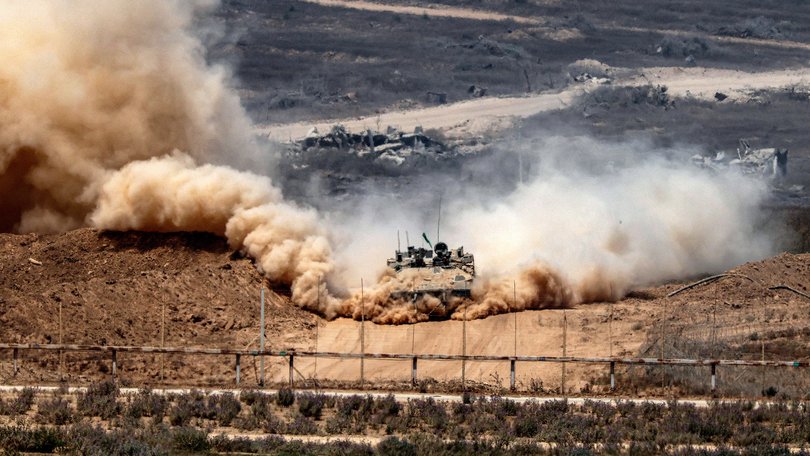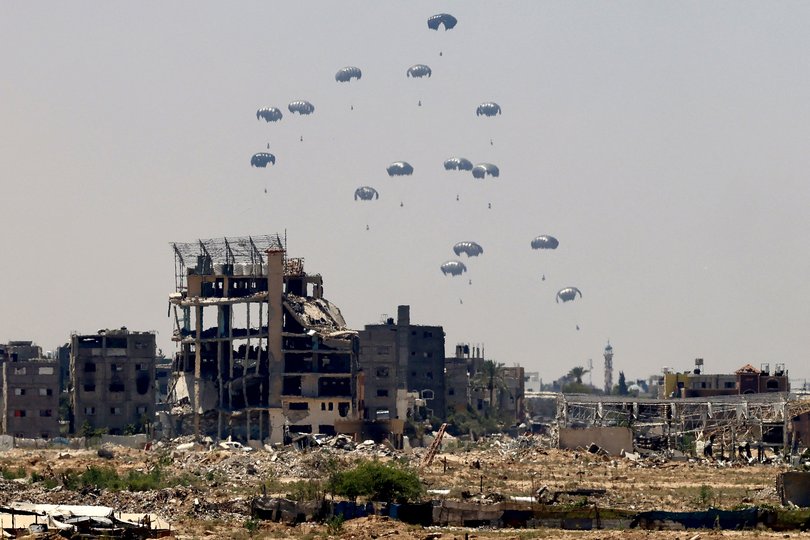Israeli military presents Netanyahu with options for expanding Gaza operation
The Israeli Prime Minister is set to discuss the details of his plan to occupy all of Gaza with officials this week.

The Israeli military’s chief of staff presented Prime Minister Benjamin Netanyahu and other security and defence officials with options for expanding operations in the Gaza Strip, a government statement said Tuesday, local time. The high-stakes consultations came as Netanyahu appeared determined to press ahead with plans to fully occupy the Palestinian enclave, despite growing opposition to the war both at home and abroad.
The prime minister “held a limited security discussion today ... in which the Chief of Staff presented the options for continuing the campaign in Gaza,” a statement from his office said. The Israel Defense Forces is “prepared to implement any decision” made by Mr Netanyahu’s security cabinet, which he plans to convene later this week, the statement added.
The plan to occupy all of Gaza means that “military operations will also take place in areas where hostages are being held,” said a person familiar with the Prime Minister’s decisions who spoke on the condition of anonymity because they were not authorised to speak with the media.
Sign up to The Nightly's newsletters.
Get the first look at the digital newspaper, curated daily stories and breaking headlines delivered to your inbox.
By continuing you agree to our Terms and Privacy Policy.The prospect of an Israeli occupation is bringing fear and uncertainty to Palestinians in Gaza, who are exhausted after nearly two years of bombardment, gunfire and displacement, and are now in the grips of a growing starvation crisis. The families of Israeli hostages still in captivity, including 20 of whom are believed to be alive, fear that expanded military operations will put their loved ones at risk. “We are gravely concerned by reports of an expansion of fighting in Gaza, which puts the hostages’ lives in even greater danger,” the Hostage and Missing Families Forum said in a statement.
A minister from Mr Netanyahu’s right-wing Likud party, Miki Zohar, said in a television interview Tuesday that if the plan is approved, “absolutely, hostages will be in danger.” But, he said, the video Hamas released of emaciated hostage Evyatar David over the weekend strengthened “the understanding” among decision-makers “that there’s no possibility in which Hamas remains in the Gaza Strip.”
In Gaza, residents said they hoped the reports Israel is planning a full occupation are a tactic to put more pressure on Hamas. But they worried about the destruction and bloodshed that would accompany a larger military operation.
“I hope he’s just saying this to pressure Hamas and the other factions - but at the same time, I know he’s capable of actually doing it,” Mohamed Ahmad Abu Alqumsan, a 25-year-old from Gaza City, said of Mr Netanyahu. “How’s he going to do it? What’s going to happen to us?” he said.
The meeting Tuesday included Netanyahu, Defence Minister Israel Katz, IDF Chief of Staff Eyal Zamir, Strategic Affairs Minister Ron Dermer and IDF operations director Itzik Cohen, according to a report on Army Radio. The report said that Lieutenant-General Zamir would present plans to surround refugee camps in the central Gaza Strip, pairing that with more airstrikes and raids.
For months, Lt-Gen Zamir, who was appointed in February, has signalled his opposition to conquering Gaza. Many members of Israel’s military and security establishment, including former high-level officials, have argued that a more comprehensive ceasefire deal to release the hostages and formally end the war should be the top priority. Hamas, they said, has been weakened militarily and would no longer pose a security threat to Israel in the way it did before the war.
They also point to an IDF investigation that found Israeli ground operations last year in the area of Rafah, in southern Gaza, “although gradual and cautious, had a circumstantial influence” on the Hamas militants who killed six hostages held in a narrow tunnel underneath the city.
“Most Israelis have supported the IDF chief of staff and most of the IDF command, who’ve been pushing for an overall permanent ceasefire,” said Eran Etzion, former deputy chief of Israel’s National Security Council. Such an agreement, he said, would see all hostages released and include an IDF withdrawal to the Gaza perimeter.
But Mr Netanyahu has been empowered by the “carte blanche that he is receiving from the US administration to reoccupy Gaza,” Mr Etzion said. “And that serves Netanyahu’s main interest of prolonging the war.”
A reporter asked President Donald Trump on Tuesday whether he supported Israel reoccupying Gaza, “as has been suggested by some Israeli officials.”
“Well, I don’t know what the suggestion is,” Mr Trump said, adding that it’s “going to be pretty much up to Israel.”
On Saturday, US special envoy Steve Witkoff told hostage families in Tel Aviv that his proposal for a temporary ceasefire and the return of about half of 20 living hostages still held by Hamas in Gaza “doesn’t work, and we’ve tried everything.”
Mr Trump, he said, “now believes that everybody should come home at once. No piecemeal deals.” He said the administration was formulating a new “all or nothing” plan. Both sides have rejected elements of the Witkoff proposal that has been on the table.
On Tuesday, the elder brother of David, the hostage, addressed a UN Security Council meeting that convened at Israel’s request. Ilay David said his brother has lost half his body weight while in Hamas captivity, putting him and the other remaining hostages in grave danger. “They are on the brink of death. They may only have days left to live, days,” he said via video link.
Israel’s war in Gaza has killed more than 60,000 people, according to the Gaza Health Ministry, which does not distinguish between combatants and civilians but says that the majority of those killed are women and children. The ministry said Tuesday that eight more had people had died of malnutrition, including a child, bringing the total number of people who have died of starvation during the war to at least 188, including 94 children.
“The images of people starving in Gaza are heart-rending and intolerable. That we have reached this stage is an affront to our collective humanity,” UN Human Rights Chief Volker Türk said Monday. “… Israel continues to restrict severely humanitarian assistance from entering Gaza, and the aid that is permitted to enter is nowhere near what is needed.”
COGAT, the branch of the Israeli Defence Ministry that coordinates civil affairs in the Palestinian territories, said Tuesday that it would again begin allowing private-sector merchants to bring goods into Gaza, including basic food products, baby food, fruits and vegetables, and hygiene supplies.

The United Nations has requested for months that private goods be allowed into Gaza, arguing that it would diversify the food available to Palestinians, nearly 1 in 3 of whom are going multiple days without eating. But since Israel said late last month that it was allowing more aid into Gaza, the UN has struggled to get the food to warehouses for more organized distribution, as both hungry civilians and armed gangs have looted the aid trucks before they can get more than a few hundred yards inside Gaza.
Israeli troops have also continued to fire on crowds approaching aid convoys, according to interviews with Palestinians, UN and aid officials and videos verified by The Washington Post. The Gaza Health Ministry said Tuesday that at least 52 people were killed and 352 injured by Israeli fire as they sought aid over the previous 24 hours.
“We’ll be in deep trouble; people are already starving, and it’s only going to get worse,” Amer Abu Amr, 41, said of Israel’s potential plans. He spoke by phone Tuesday from the tent he is living in west of Gaza City.
“There’s nowhere safe to go,” he said. “I’m afraid of the unknown.”
© 2025 , The Washington Post.
